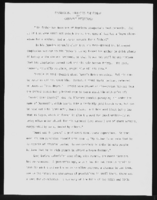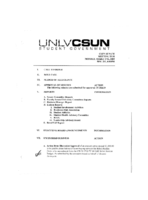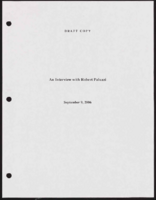Search the Special Collections and Archives Portal
Search Results

"Falsehoods, Fallacies and Fakery": article draft by Roosevelt Fitzgerald
Date
Archival Collection
Description
From the Roosevelt Fitzgerald Professional Papers (MS-01082) -- Drafts for the Las Vegas Sentinel Voice file. On Dumas, Tamarillo, and Afrocentric history curriculum.
Text
Audio clip from interview with Nathaniel Whaley by John Grygo, March 6, 2013
Date
Archival Collection
Description
In this clip, Nathaniel Whaley talks about the differences between the opportunities for weekend entertainment for black and white young people in Las Vegas in the 1940s and 1950s.
Sound
Audio clip from interview with Ruby Amie-Pilot, August 7, 2012
Date
Archival Collection
Description
Part of an interview with Ruby Amie-Pilot on August 7, 2012. In this clip Amie-Pilot talks about plans to picket Floyd Patterson fight at the Las Vegas Convention Center, because blacks not allowed to attend.
Sound
Audio recording clip from an interview with James Jones Jr. by Barbara Tabach, February 28, 2013
Date
Archival Collection
Description
Part of an interview of James Jones, Jr. conducted by Barbara Tabach, February 28, 2013 . Jones Jr. highlights his work opportunities and racism in 1959 Las Vegas. In the clip, Jones Jr. discusses his first job in Las Vegas, where he became ill after four hours, and his subsequent job at a neighborhood grocery store.
Sound
Audio recording clip of interview with Greg McCurdy by Claytee D. White, August 31, 2013
Date
Archival Collection
Description
Part of an interview with Greg McCurdy by Claytee White on August 31, 2013. McCurdy talks about one of his mentors, Herman Moody, the first African American police officer in the Las Vegas Metropolitan Police Department.
Sound
Audio recording clip of interview with Lucille Bryant by Claytee D. White, December 13, 1995
Date
Archival Collection
Description
Part of an interview with Lucille Bryant conducted by Claytee D. White on December 13, 1995. In the clip, Bryant compares economic opportunities in Tallulah and Las Vegas in the 1950s.
Sound

Meeting minutes for Consolidated Student Senate, University of Nevada, Las Vegas, October 17, 2005
Date
Archival Collection
Description
Text

Transcript of interview with Robert Paluzzi by Claytee White, September 5, 2006
Date
Archival Collection
Description
Claytee White interviews Robert Paluzzi on September 5, 2006.
Text

Transcript of Interview with Ruby Duncan by Claytee D. White on February 13 and March 2, 2007
Date
Archival Collection
Description
Interview with Ruby Duncan conducted by Claytee White in two sessions on February 13, 2007 and March 2, 2007. Duncan discusses her employment history and dependence on public assistance in Las Vegas, as well as her participation in the Welfare Rights Movement and Operation Life.
Text

Transcript from interview with Mike Unger by Barbara Tabach, January 21, 2016
Date
Archival Collection
Description
In this interview, Unger reflects upon his long and successful career in hotel management in Las Vegas and also in Arizona and Pennsylvania. He shares stories as a local celebrity, particularly in the 1970s and 1980s when he worked at Caesars Palace, as well as the big projects he oversaw, including organizing the first big fight nights, World Series of Tavern Poker and Grand Prix race. He talks about working with Morris Shenker, Moe Dalitz, Cliff Perlman and Billy Weinberger, and the role of the Jewish community in the city, and specifically in the gaming industry. Unger also discusses his non-gaming industry ventures which have included a satellite communications business and a bagel business.
Mike Unger was born in Queens, New York in 1947, and spent most of his childhood in Long Island, growing up in a predominantly Jewish and Italian community. As a young adult, Unger was already working hard, running one of his family?s restaurant after school. When he was in high school, his family moved to Los Angeles to accommodate his father?s health needs, and eventually end up in Las Vegas by 1967. Over the next two decades, Unger would work at nine properties in the city. Unger is one of the University of Nevada, Las Vegas? first hotel management graduates, and started his career with Summa Corporation in its management training program at the Frontier Hotel and Casino. After a brief stint at the Airport Marina Hotel in Los Angeles in 1972, Unger returned to Las Vegas, serving in management capacities at the Aladdin Hotel and Casino, Summa Corporation headquarters and Landmark Hotel and Casino. In 1978, he joined Caesars Palace Hotel and Casino management team, and was integral in creating the city?s first large boxing events, the World Series of Tavern Pool, and the Grand Prix race. Unger also ran properties for the White Mountain Apache and Colorado River Indian Tribes in Arizona, as well as the Showboat Hotel and Casino. In this interview, Unger reflects upon his long and successful career in hotel management in Las Vegas and also in Arizona and Pennsylvania. He shares stories as a local celebrity, particularly in the 1970s and 1980s when he worked at Caesars Palace, as well as the big projects he oversaw, including organizing the first big fight nights, World Series of Tavern Poker and Grand Prix race. He talks about working with Morris Shenker, Moe Dalitz, Cliff Perlman and Billy Weinberger, and the role of the Jewish community in the city, and specifically in the gaming industry. Unger also discusses his non-gaming industry ventures which have included a satellite communications business and a bagel business.
Text
